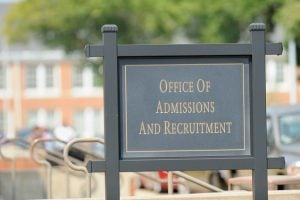[ad_1]

(Image via Getty)
Before World War II, only about 5% of Americans held a bachelor’s degree.
Then, something fairly remarkable happened. A huge proportion of America’s young men (along with a significant number of its young women) served in the war. When they got back, they qualified for the GI Bill.
Former servicemembers went to college in droves. Almost half of newly admitted college students in 1947 were veterans. Unlike disaffected WWI veterans, who had received some financial assistance from the government but no educational benefits, WWII veterans were eligible for free tuition and a cost-of-living stipend while they obtained their degrees. For the first time in American history, higher education became a real option for the working class.
The reasons for the boom in household incomes and gross domestic product during the latter portion of the 20th century are dizzyingly complex. It probably didn’t hurt that the Allies had just finished leveling a number of their international competitors. Still, it would be hard to dispute that the 8 million or so WWII veterans who took advantage of the educational benefits offered by the GI Bill, and the more educationally focused culture they created, deserve some credit.
To this day, the typical worker with a bachelor’s degree earns significantly more than a demographically similar worker who only received a high school education. According to the New York Fed, for full-time workers ages 22-27, as of early 2022, the median annual wage is $22,000 higher for those with a college education compared to those with a high school diploma. That’s the highest education-based earnings gap ever recorded since the New York Fed began tracking this stat more than 30 years ago.
There are notable exceptions, of course. Everyone knows some marvelously successful small business owner who didn’t go to college and nonetheless out-earns any number of peers with fancy degrees. Everyone also knows someone drowning in student loan debt who serves lattes or waits tables just to get by. Broadly speaking, however, higher education increases incomes, helps workers become more resistant to outsourcing, and creates the baseline knowledge that fosters technological innovation.
All of which are good reasons to be somewhat alarmed about the sustained drop in college enrollment in America. New data shows that between the fall of 2021 and the fall of 2022, U.S. colleges and universities shed 1.1% of their undergraduate students. That is a smaller decline than those seen in the falls of 2020 and 2021, when at least a million fewer students enrolled in college due to the pandemic. Yet, with college enrollment numbers still falling even as the pandemic wanes, there is cause for concern.
The number of undergraduate students in America is now about 7% lower than it was in the fall of 2019, before the coronavirus pandemic. There is mounting evidence that this is not because of some predestined marketplace-style boom and bust in the college enrollment cycle. Rather, it seems we might have created several “lost classes” of high school graduates who fell off the college track — and might never get back on it.
America needs a well-educated populace for a number of reasons — good incomes and scientific progress among them. But it’s not all about economic competitiveness. Donald Trump had about two-thirds support among noncollege-educated whites in 2016. Not having seen what a Trump presidency was actually like yet, some level of naïveté in the 2016 electorate is forgivable. When 2020 came, though, Trump only lost about 1% of the support among noncollege-educated whites that he enjoyed in 2016 — right before he went on to encourage a mob of his most fervent supporters to ransack the Capitol in a ham-fisted attempt to take the presidency by force.
That’s a meaningful 1%. Some people did get educated, formally or otherwise.
I don’t think there’s such a thing as too much education. Even if learning more doesn’t improve your income stream one bit, it will sure help you make better decisions.
The higher education system is the weapon the United States needs to fight the conflicts it will face in the 21st century. If we want to outcompete China economically, if we want to defeat rising authoritarianism globally, we need an educated populace. I hope we can rally around our young people and the educational advancement they need, yes, to advance our economy, but also to advance our democracy.
Jonathan Wolf is a civil litigator and author of Your Debt-Free JD (affiliate link). He has taught legal writing, written for a wide variety of publications, and made it both his business and his pleasure to be financially and scientifically literate. Any views he expresses are probably pure gold, but are nonetheless solely his own and should not be attributed to any organization with which he is affiliated. He wouldn’t want to share the credit anyway. He can be reached at jon_wolf@hotmail.com.
[ad_2]




